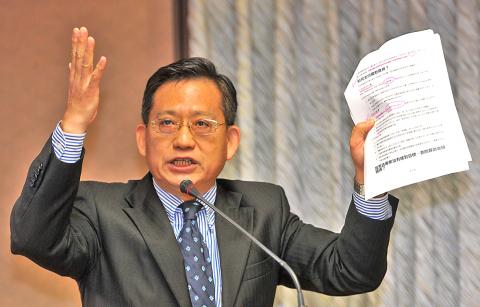A visit to Taiwan by the Dalai Lama could be considered as the Tibetan religious leader returning to China, because “Taiwan is also the land of China,” Chinese Nationalist Party (KMT) Legislator Wu Yu-sheng (吳育昇) said yesterday.
Democratic Progressive Party Legislator Chen Chih-mai (陳其邁) criticized Wu, saying that he might as well call Taiwanese legislators “members of China’s National People’s Congress.”
Wu made the remarks at a meeting of the legislature’s Internal Administration Committee to examine the budget of the Mongolian and Tibetan Affairs Commission, an agency that seems an incongruous fit for Taiwan, but still sits within the Republic of China’s institutional framework.

Photo: Liu Hsin-de, Taipei Times
During a meeting with Mongolian and Tibetan Affairs Commission Minister Jaclyn Tsai (蔡玉玲), Wu said the Dalai Lama should be welcome to visit the nation, but China’s reaction should also be taken into consideration lest his visit be interpreted as encouraging Tibetan or Taiwanese independence.
“Since both sides of the Strait belong to one China,” Wu said, a visit by the Dalai Lama to Taiwan could be considered as “a return to China,” despite the Dalai Lama being banned from setting foot in China.
“Insofar as we, the KMT, uphold the ‘one China, different interpretations’ principle, Taiwan counts as China,” the legislator said.
Wu also said that the 11th incarnation of the Panchen Lama could also be invited to visit Taiwan so he could meet with and be “recognized” by the Dalai Lama, an arrangement that “should not be opposed by Beijing.”
Chen tore into Wu’s “outrageous proposal,” saying that the present Panchen Lama was controversially chosen by the Chinese government, while the one asserted by the Dalai Lama to be the actual 11th incarnation of the Panchen Lama is said to have been imprisoned since he was six years old, in 1995, and whose situation remains unknown to the outside world.
“If [arranging a meeting between the Dalai Lama and the Beijing-appointed Panchen Lama] does not count as an insult to the Dalai Lama, what does?” Chen asked.
Chen also lambasted Wu for calling Taiwan “China,” asking the KMT legislator whether they both were members of China’s National People’s Congress (NPC) and the committee an NPC committee.
Chen then asked Tsai whether she agrees with Wu’s claim that Taiwan is “China” so a visit to Taiwan is tantamount to a visit to China, whereupon Tsai said that the question should be referred to the Mainland Affairs Council (MAC).
Wu was unhappy with Tsai’s answer, calling her timidity in “guarding the country’s Constitutional position a public official’s malfeasance.”
MAC spokesperson Wu Mei-hung (吳美紅), in response to the uproar over Wu’s remarks, said that the cross-strait relationship has always been positioned as “one Republic of China, two regions” according to the Constitution of the Republic of China and the Act Governing Relations Between the People of the Taiwan Area and the Mainland Area (臺灣地區與大陸地區人民關係條例).
This understanding of the relationship has been unchanged for 20 years and has survived three presidents, she said.

The Taiwanese passport ranked 33rd in a global listing of passports by convenience this month, rising three places from last month’s ranking, but matching its position in January last year. The Henley Passport Index, an international ranking of passports by the number of designations its holder can travel to without a visa, showed that the Taiwan passport enables holders to travel to 139 countries and territories without a visa. Singapore’s passport was ranked the most powerful with visa-free access to 192 destinations out of 227, according to the index published on Tuesday by UK-based migration investment consultancy firm Henley and Partners. Japan’s and

NATIONAL SECURITY THREAT: An official said that Guan Guan’s comments had gone beyond the threshold of free speech, as she advocated for the destruction of the ROC China-born media influencer Guan Guan’s (關關) residency permit has been revoked for repeatedly posting pro-China content that threatens national security, the National Immigration Agency said yesterday. Guan Guan has said many controversial things in her videos posted to Douyin (抖音), including “the red flag will soon be painted all over Taiwan” and “Taiwan is an inseparable part of China,” while expressing hope for expedited “reunification.” The agency received multiple reports alleging that Guan Guan had advocated for armed reunification last year. After investigating, the agency last month issued a notice requiring her to appear and account for her actions. Guan Guan appeared as required,

Japan and the Philippines yesterday signed a defense pact that would allow the tax-free provision of ammunition, fuel, food and other necessities when their forces stage joint training to boost deterrence against China’s growing aggression in the region and to bolster their preparation for natural disasters. Japan has faced increasing political, trade and security tensions with China, which was angered by Japanese Prime Minister Sanae Takaichi’s remark that a Chinese attack on Taiwan would be a survival-threatening situation for Japan, triggering a military response. Japan and the Philippines have also had separate territorial conflicts with Beijing in the East and South China

A strong cold air mass is expected to arrive tonight, bringing a change in weather and a drop in temperature, the Central Weather Administration (CWA) said. The coldest time would be early on Thursday morning, with temperatures in some areas dipping as low as 8°C, it said. Daytime highs yesterday were 22°C to 24°C in northern and eastern Taiwan, and about 25°C to 28°C in the central and southern regions, it said. However, nighttime lows would dip to about 15°C to 16°C in central and northern Taiwan as well as the northeast, and 17°C to 19°C elsewhere, it said. Tropical Storm Nokaen, currently